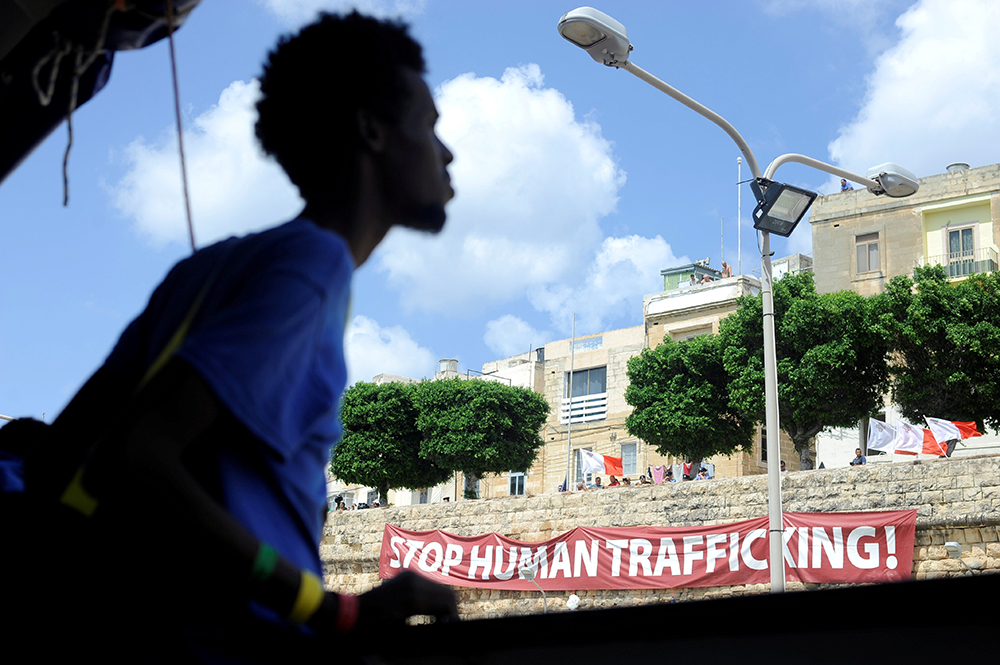
A man walks past a banner reading "Stop Human Trafficking!" in 2018 in Valletta, Malta. (OSV News/Reuters/Guglielmo Mangiapane)
More than two months after 5-year-old Loan Peña went missing in the northeastern Argentina town of Nueve de Julio, the church continues to promote marches to demand his captors release him.
Loan's case is one of many concerns of church groups in Argentina that combat human trafficking and the exploitation of people for labor and sexual purposes.
On Aug. 26, Bishop Adolfo Canecín of Goya, about 45 miles southwest of Nueve de Julio, attended a march and presided at a Mass in honor of the boy, who disappeared June 13 after a visit with his grandmother. Members of Loan's family, as well as activists of ecclesial movements that work against human trafficking, attended the gathering.
An organization of church groups that combat human trafficking has been growing in the South American country. In July, a number of the groups gathered in Buenos Aires and launched the Argentine chapter of the Latin American and Caribbean Ecclesial Network on Migration, Displacement, Refuge and Human Trafficking — known in Spanish as Red CLAMOR, or CLAMOR Network.
Called by the Argentine bishops' conference's Commission for Migrants and Refugees, known as CEMI, movements fighting human trafficking came together for a street march July 28, in which demonstrators demanded attention from the authorities to avoid new cases like that of Loan.
Banners with Loan's name, along with the demand that he be sent back to his family alive and well, were the dominant elements of the protest. There have been countless cases like the boy's all over Argentina over the past years. Victims are remembered each year on July 30 during commemorations of the World Day Against Trafficking in Persons.
Pope Francis has been a strong international voice in denouncing human trafficking, calling it a "global scourge."
"It is a call to take action, to mobilize all our resources in combatting trafficking and restoring full dignity to those who have been its victims," the pontiff said in February, warning that "If we close our eyes and ears, if we do nothing, we will be guilty of complicity." He made the comments in his message for the 10th World Day of Prayer and Awareness against Human Trafficking.
Advertisement
"I dare to say that the pontiff is the world leader who has most given visibility to the issue of human trafficking, incentivizing us to work in networks with other movements that combat it," lawyer Ayelén Tomasini, a member of the bishops' conference's National Justice and Peace Commission and a coordinator of the No to Human Trafficking team, told OSV News.
Scalabrinian Fr. Juan Antonio Ramírez, CEMI's secretary, said that human trafficking is not something new in Argentina, with hundreds of cases coming and going over the years and never being solved because no decisive clues are ever found.
"Many of such problems occur in a sphere of crime and violence, so they are invisible for most in society," Ramírez declared.
The priest said that a great part of the police operations against human trafficking involve labor exploitation. Victims usually come from the countryside or from neighboring countries. Their vulnerability draws the criminals' attention.
"Despite the economic hardships Argentina has been facing over the past years, the influx of immigrants has been mostly unaltered," he said, adding that they end up finding informal jobs and working in illegal and undignified activities.
In 2023, the unemployment rate in Argentina was 5.7%. In the first quarter of 2024, it jumped to 7.7%.
Tomasini emphasized that social vulnerability is something that stimulates human trafficking and slave labor exploitation, so certainly that situation has been deteriorating lately.
Argentine President Javier Milei, who took office in December 2023 with the goal of reducing the state's participation in the Argentine economy, has drastically diminished the amount of money spent on programs of prevention and rescue of victims of violence and human trafficking, according to the nongovernmental organization Civic Association for Equality and Justice.
Numerous church organizations work on the front lines of humanitarian aid that benefits people vulnerable to human trafficking, like public restaurants run by parishes where people can have a hot meal for free.
"With the economic crisis, however, many times food just doesn't arrive at such restaurants. Catholic groups have been complaining about it," Tomasini described.
"The church has a capillary work, but of course it doesn't manage to do everything that should be done. That's why we must organize networks," Tomasini said.
In her opinion, extra attention should be given to activities that can help prevent human trafficking, like those involving education, and the prosecution of criminals connected to solved cases.
"Loan Peña's case gained national visibility after the press began discussing it. That should help society to understand that there are many more invisible cases like his," she added.







